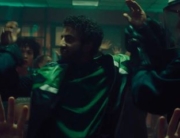The Unknown Known gives you a front seat to recent history through the calculated point of view of one man who, astonishingly, was at the right hand of Republican power for almost 50 years. Donald Rumsfeld was the ultimate Teflon bureaucrat, cannily leaving each office he served in just before the political consequences would hit the frying pan.
His protective shield was the CYA Memo, as in Cover Your Ass, tens of thousands of them, staggering shelves of binders full of memos that lay out detailed options for coulda, woulda, shoulda decisions that a higher-up can make. In director Errol Morris’s 10th documentary feature, Morris uses a snow globe as a continuing visual motif to represent Rumsfeld’s obfuscation, and Rumsfeld shrewdly uses Morris as much as the late Robert McNamara did in The Fog of War (2003).
But instead of that profound mea culpa, Rumsfeld seems to have the opposite agenda: to enjoy the volleying and to easily stonewall Morris with a sly grin and sleights of semantics. This is a dazzling performance by the consummate wily politician who has coolly batted around the Washington press corps and Democrats like a cat with a mouse.
Morris is no match for him (this is no Frost/Nixon), though he well lays out and edits together photographs, charts, maps, and footage from Rumsfeld’s impressive Zelig-like career of being at key decision-making points from the Eisenhower administration on: in Congress (a staffer 1957–1962, elected 1963-1969), a broad array of federal agencies, the Ford White House, representing Reagan overseas (he’s seen shaking hands with Saddam Hussein), and, most visibly, leading the Pentagon under first Ford then George W. Bush and into the Iraq War.
He good-naturedly reads out loud extensive selections from his infamous policy memos as his words are typed out on the screen like a valuable political science lecture. In Washington, his memos were called snowflakes, and they pile up in a blizzard on the screen.
The title comes from his frequently cited quote, first identified with him at a 2002 press conference, but one he had already proffered in a prescient pre-9/11 memo, expanded on in Congressional testimony and in his autobiography Known and Unknown. It became known as his response to Saddam’s weapons of mass destruction controversy: “SUBJECT: What You Know—There are known knowns. There are known unknowns. There are unknown unknowns. But there are also unknown knowns—that is to say, things that you think you know that it turns out you did not.” But he and Morris volley on and on, as Rumsfield adds a philosophical addition for posterity, and to tease Morris with: “The unknown knowns—things that you possibly may know that you don’t know you know,” and shrugs that it could be reversed.
Morris presses him to identify with Machiavelli, but he eerily seems more like a bureaucratic Iago, egging on those just above him while managing to slip out of personal responsibility through champion debate skills: “Demand me nothing. What you know, you know. From this time forth I never will speak word.” At least regarding any words of confession or change of conscience.






Leave A Comment